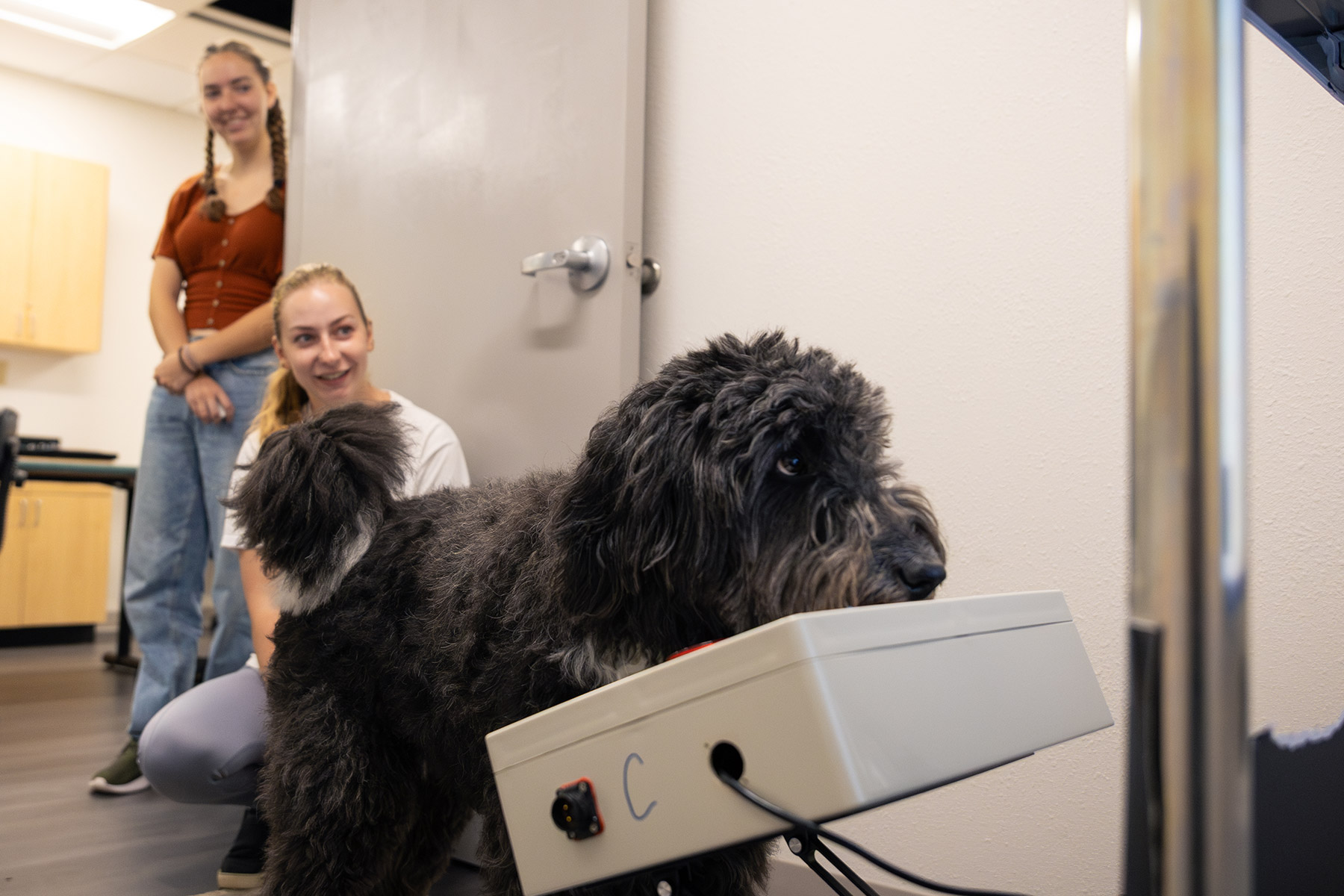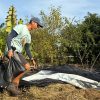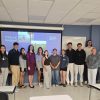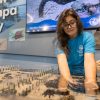What Orlo is doing is no accident.
In the video, Orlo, a 2-year-old Australian shepherd poodle mix, is standing in front of a computer screen in the Eckerd College Comparative Psychology Lab—which recently got a big research boost from an Association of Professional Dog Trainers Foundation grant.
Using his snout, he presses one of four large buttons on a panel to guide a big blue dot up, down or sideways across the screen. Two black boxes, spaced apart, are also on the screen. The object is for Orlo to use the buttons to move the blue dot across the screen to a box. When that happens, the box disappears, Orlo receives a treat, and he’s on to the second box.
When both boxes are gone, two new boxes appear on different parts of the screen. Orlo has a new puzzle to solve. It’s a simplified version of PAC-MAN. And Orlo—a dog—is very good at it.
This kind of experiment had never been done, until Lauren Highfill, Ph.D., a professor of psychology and animal studies at Eckerd, came upon the idea of a dog learning how to play rudimentary video games that hopefully leads to improvements in the animal’s learning ability and overall mental health.
Highfill and two colleagues were recently awarded a $2,120 grant for their project titled Enhancing Canine Enrichment Through Computerized Gaming Interfaces. Highfill will serve as principal investigator with her collaborators Sarah Nadler ’10, visiting assistant professor of animal studies at Eckerd and a licensed mental health counselor, and Kelley Winship, Ph.D., a scientist at the National Marine Mammal Foundation in San Diego.
Highfill explains that the idea came from a guest lecture Winship gave for her via Zoom last year. “She was talking about some of the research being done with California sea lions in San Diego,” Highfill says. “How using video gaming gives them some additional enrichment when they’re in their enclosures, to stimulate their brains. There has also been similar work done with lab primates in the past.
“As I was watching her present the lecture,” Highfill says, “I wondered if dogs could do that. So we decided to give it a try with some dogs here at the Comparative Psychology Lab at Eckerd. Allison Kenawell ’24, who had interned with Dr. Winship in San Diego, applied for an internal grant from Eckerd to get things going. And Sarah Nadler has a therapy dog named Orlo that she adopted. So we started training him, and he’s been doing great. He really seems to enjoy playing the game. But he does get frustrated. It’s like watching a kid play a video game.”
Highfill says the team applied for the grant to support research that looks at dog training. “I’m fascinated to see how far he can go solving these problems,” she says. “What are the best practices when it comes to training? How can we help working dogs be successful?”
Highfill adds that while past research has shown that dogs can utilize touch screens for research purposes, this is the first time dogs have been introduced to a gaming console that controls a cursor on a game screen. This gaming approach, she says, “affords greater flexibility compared to touch screens in terms of playable content. Our primary focus presently lies in refining training methodologies and conducting behavioral observations throughout gameplay sessions.”
Orlo, who also works as a therapy dog in Nadler’s mental health practice, has been training on the blue-dot–black-box game since July 2023 and has reached Level 6—the final level. He has put in about 50 20-minute training sessions with a total screen time of about 14 hours.
“Now that we have successfully trained Orlo, we would like to recruit additional dogs from the community to serve as subjects,” says Highfill, who founded the Eckerd College Dog Training Program in 2022. “Specifically, we plan to reach out to local dog trainers about their own personal dogs participating, as we would like to continue with dogs who have an established training repertoire.
“Overall, we hope that this research will add to the growing literature on dog cognition and contribute to improving dog welfare in homes, labs and shelters.”













